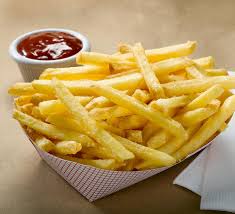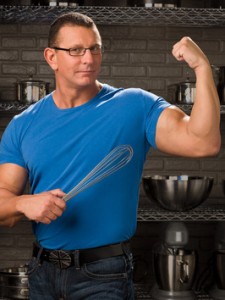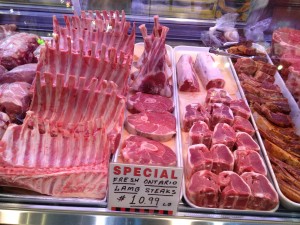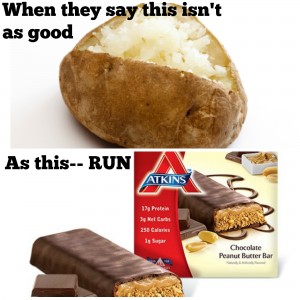How Much Protein Do You Need?
For the average person, a half-pound burger has enough protein (47 grams of protein in the burger and 4 grams in the bun a total of 51 grams of protein ) for the average person per day. And add 1 serving of broccoli you get 4 more grams – ok, so you had French Fries- that is still 4 grams of protein.

French fries are readily available in low income areas – 312 calories for these fries, but a single baked potato has 93 calories with less fat and still 4 grams of protein.
There are a lot of figures about the optimal amount of protein a person should consume. The World Health Organization recommends 56 grams of protein a day for a sedentary man and 48 grams for a woman.
When tested for protein requirements, “strength athletes” who ate 126 grams of protein per day were found to have more than enough protein.
So the dedicated gym rat “lifter” who weighs 225 pounds would do fine with single Porterhouse steak.
Since most gyms make more money selling protein powder than memberships, it is likely that there is no deficiency to be found among those who make the gym their second home.
Protein Powder and Those Big Biceps

My friend, Robert Irvine got his muscles by working out and eating healthy food
Ever see those workout magazines showing muscular people drinking protein shakes and flexing those incredible biceps? They certainly give you the impression that if you drink that shake, or eat more protein, you too could have those six-pack abdominal muscles or huge biceps. But the truth of the matter is that adding more protein to your diet will not increase muscle mass or strength. Your body does not store protein, so if you eat too much protein your body has several choices of what to do with those extra amino acids: it can break them down further and excrete them in the urine; it can convert some to glucose and ketones; and some can become fat.
Protein does not increase muscle bulk; protein is not like “miracle-grow” for muscles. Muscles grow because they are used, or exercised, not because you are consuming extra protein. Growth hormone, as well as some other anabolic steroid hormones, can also increase muscle growth, but they only work in combination with exercise.
When muscles need energy to burn they rely on glucose, not protein. Protein is used to build some of the muscle parts, and to repair the muscles. Athletes at the top of their game can get plenty of protein from the foods they eat, although most of them supplement with various bars and shakes.
Protein bars and powders come in various forms and can be convenient source of food, but not all of them have appropriate levels of other nutrients. Your guts are very good at extracting protein from meat, fish, poultry, and plants.
Protein Bars and Powders
In the 1950s Irvin Johnson made an egg-based protein powder that he sold near the Paramount studios in Hollywood. He was a great marketer, and by getting the Hollywood folks to buy his drink it he used the power of their celebrity to get the public to purchase his powder. His belief was that “mother’s milk is the perfect food for human growth—designed by nature. The food closest to it isn’t cow’s milk, but the egg.” He changed his name to Rheo Blair on the advice of an astrologer who said he would be successful if he had more “r” and “s” in his name. His protein powder was high in fat.
He hasn’t been heard of today because at the same time the magazines were filled with Joe Weider’s soy-based product that was pushed by a young bodybuilder that Weider had brought to America named Arnold Schwarzenegger.
Some of the first protein powders widely marketed were expensive—over twenty dollars a shake—and tasted horrid. But today the manufacture of protein powders and placement of those ingredients into products has become common, with the price going down and the flavors improving. (This is a relative statement. When it comes to protein drinks few tastes better than a steak or a milkshake). Today the average protein drink costs less than two dollars and you can get them in a number of flavors. Most of the protein powders that are used to make drinks, bars, and shakes come from China- over 90 per cent of them do.
In every grocery store or pharmacy you will see rows of protein bars and protein drinks, and powders to make protein drinks and smoothies. Even breakfast cereals are marketing themselves as having “extra protein.” Protein powders are sold in Wal-Mart, Costco, and almost any pharmacy. Personal trainers often have no formal training in science or biology, but still “prescribe” supplemental protein without scientific basis to their clients.
Evidence about Protein Supplements
There is, not surprising, a large body of literature looking at the protein requirements of a variety of people, from those who have severe illness (like burns, or trauma) to people involved in various sports.

As appealing as high protein diets sound: eat as much of this as you want- protein alone is fool’s gold as a basis of a diet plan
Self-proclaimed fitness experts like to argue which protein is better (oddly it is often the protein they are selling). There are two types of common protein whey (which is isolated from curdled milk) and soy-based proteins, and there are some pea based proteins as well as egg based. Most will tell you that whey protein is the most bioavailable. Whey protein is the milk that is discarded when making cheese. The difficulty is that those protein sources have a bitter flavor—they taste almost as good as sawdust. In order to make them taste better, protein makers add sweeteners, which can be anything from high fructose corn syrup to sugar alcohols to artificial sweeteners.
Most data now suggests that if you really must take a protein supplement, whey protein is the highest quality and better able to support muscle protein synthesis than soy protein. There is VERY WEAK evidence to suggest that whey protein supplementation, especially in overweight and obese individuals may assist in long-term maintenance of body weight without energy restriction (that we sell more protein powders to overweight people and have increasing obesity might tell you how strong this evidence is).
The data, however, is still VERY incomplete. Better data shows that diets with protein sources from food work best. Let the gym rates argue which protein source is better—your guts don’t care. Your guts like real food.
Protein supplements are a multi-billion dollar industry. They are involved in weight training, weight loss, and have as many claims about their value to health as other supplements. Modular proteins should be viewed as less helpful than developing healthy eating habits.
Then there is the ever-present marketing campaign for more protein from a bar. They market the ease of a snack in a foil package with the convenience of taking it anywhere and the “health” of it being a protein product. The difference between most protein bars and a Snickers bar is taste and price.
A Lemon Zest Luna bar ($1.20) has 180 calories, with 9 grams of protein and 5 grams of fat.
A Chocolate Chip Peanut Crunch Cliff bar ($1.42) has 260 calories with 11 grams of protein and 6 grams of fat.
A Snickers bar ($1.00) 250 calories with 4 grams of protein and 12 grams of fat.
A turkey breast sandwich from Subway ($4.00) has 283 calories with 18 grams of protein and 3.5 grams of fat.
Your gut would prefer the sandwich. Make your own turkey breast sandwich and it costs less than a buck. Not only will it cost you less, it will taste a lot better.

It is hard to imagine that a protein bar is “bad” – it sounds good. And for years the poor potato has been abused by weight loss books everywhere. But which fills you up? So think about this – someone is trying to sell you something…
Vegetable Proteins
The question is, does your body care if the proteins you eat come from an animal or a vegetable, or a protein powder designed in some scientist’s laboratory? You will pay more for the more highly processed proteins (drinks and bars) than if you eat real food that you make.
When that protein is broken down into peptides of amino acids, does your body have any idea where it came from? The answer is obvious. (Okay, the answer is “no.”)
Is More Protein Better, or Dangerous?
Now comes evidence that many protein powders have concerning levels of heavy metals and pollutants (lead, cadmium, PCB’s) and the ones that have the highest levels were those labelled “organic” and those made from plant sources.
Excess proteins in diet translate to extra amino acids that go from the guts to the liver. If there is a need for those amino acids, they are shunted off to the place of need. If there is no need, there is no way for the body to store them as protein.
Most excess proteins are converted into urea and filtered out with urine. If you have a kidney disease, urea will build up and can cause toxicity. But eating excess protein does not lead to kidney disease, and normal kidneys can handle protein quite well. If you have the genetics for kidney stone formation, excess protein can lead to kidney stones. Too much protein is a diuretic, leading to more urination, which can lead to dehydration.
Eating excess proteins also leads to increased ammonia levels. A healthy liver would easily process the ammonia making it into urea. If the liver is impaired and cannot process the ammonia, it will enter the bloodstream and lead to fuzzy thinking, and even stupor and coma. People with liver failure are often placed on low-protein diets (meaning eating only enough protein to replace what the body uses). But eating excess protein doesn’t get your liver into trouble. There is no reason to deliberately over-consume proteins.
You will not, if you eat lion heart, have the ability, agility, or courage of the lion. But you will piss out the heart of an amazing creature because of an ill-found logic. You are not what you eat when it comes to protein, but there are a lot of marketing people out there that want you to think you need more protein to get there.
Weight Loss Surgery Patients
The requirements for protein intake for weight loss surgery are the same as those who are sedentary which at most is about 40 to 80 grams of protein per day. More is not better. The variation in the amount is the difference between WHO guidelines and RDA guidelines, but also accounts for muscle mass. Often in the early post operative period patients are not getting enough protein from their diet, but should attempt to. This is where supplementation is important.
Distal bypass patients (duodenal switch, long RNY, SASI, SADI) may not absorb protein as well as gastric sleeve or Lap-Band patients, and need to be monitored for pre-albumin to see if they getting adequate intake of protein.
Protein shakes often seem like a reasonable alternative but some protein supplements do not have essential amino acids to make a complete balanced protein. Often those labeled as “boost” contain non-essential amino acids but have high levels of protein.
Some protein shakes cause abdominal discomfort to patients. Weight loss patients should avoid milk products because many people have lactose intolerance and taking milk may cause discomfort. Exceptions are yogurt and cottage cheese.
We like Unjury protein shakes. They are whey based, reasonable in cost and have very little digestive issues.
Eating real food provides most of the protein a post operative patient can eat once they are on a diet. As a guide: 3 ounces of yellow fin tuna is about 27 grams of protein. Four ounces of chicken thigh is 28 grams of protein. One egg is about 6 grams. Steak is about 10 grams per ounce, sometimes more. Hummus is about 3 grams per two tablespoons. One cup of Tempeh is about 31 grams of protein.
In the long term, protein requirements are often met with real food, but what is missing are the nutrients found in fruits and vegetables. This cannot be made up with vitamins. An attempt should be made to include more fruits and vegetables in the diet.
EAT REAL FOOD
Transcript
Terry Simpson: Go into grocery store and you will find protein powders, pre-made protein drinks and protein bars. They are everywhere. They’re sold in gyms. Most gyms, by the way, make more money selling protein powder than they do selling memberships. Protein supplements are sold through multi-level marketing schemes, by your friends. You would think that with all of the protein products on the shelves, our population suffer from mass protein deficiency. But we don’t.
Terry Simpson: On today’s show, protein supplements. Not only are they not needed, but the protein supplement you take may harm you. My name is Doctor Terry Simpson and this is Culinary Medicine, where we sort out the crazy from credible about food, from its source to its effect on your body. Busting myths and showing evidence where food can be medicine.
Terry Simpson: Ever see those workout magazines showing muscular people drinking protein shakes and flexing those incredible biceps? They give you the impression that if you drink that shake, you too could have those six pack abdominal muscles or huge biceps. Oh yeah. But the truth of the matter is adding more protein will not increase your muscle mass or strength. Your body doesn’t store protein so if you eat too much protein, your body has several choices of what to do with those extra amino acids. It can break them down further and excrete them in the urine, it can convert some to glucose and ketones, and some can become fat. Yes, fat. Maybe that low carb diet isn’t working for a reason.
Terry Simpson: Protein does not increase muscle bulk. Protein is not a miracle grow for muscles. Muscles grow because they’re used or exercised, not because you’re consuming extra protein. In the 1950s, a man by them name of Irvin Johnson made an egg based protein powder that he sold near the Paramount Studios in Hollywood. He was a great marketer and by getting Hollywood folks to buy his drinks, he used the power of celebrity to get the public to purchase his powder. And it worked for a while. You probably haven’t heard of him because he was out marketed by one Joe Weider. Weider won the protein powder wars based on the endorsement of a young body builder that Weider had brought to America. His name, Arnold Schwarzenegger.
Arnold S: I’ll be back.
Terry Simpson: Today in every grocery store or pharmacy and vitamin shop, you’ll see rows of protein bars and protein drinks and powders. Even breakfasts cereals are marketing themselves as having extra protein. Personal trainers often having no formal training in science or biology but still prescribe “supplemental protein” without a scientific basis to their clients. But there is a very serious and large body of scientific literature looking at the protein requirements of a variety of people. From those who have severe illness like burns or trauma to people involved in athletic sports. The serious literature doesn’t support people buying any of those protein supplements. The protein that is prescribed for the severely injured in the intensive care unit or burn units or hospitals are needed and lifesaving. The protein we give those patients cannot be purchased over the counter. That protein is considered medicine, not a supplement. And medicine is tightly regulated and even more tightly manufactured.
Terry Simpson: But supplements are not regulated like the medical industry. Supplements can make vague claims about how their product will affect your health. In this case, or muscles or weight loss. Misrepresenting science and convincing you and yours that this protein supplement will make you strong, help you lose weight, or keep you feeling full. In truth, none of those claims are true.
Terry Simpson: As a physician who does weight loss surgery and is certified in culinary medicine, the only protein deficiencies in patients I see are those who have advanced cancer and those with severe end stage disease like heart disease or infectious diseases like Tuberculosis or AIDS. Over 90% of the protein powders, the ones that are used to make those supplements and bars come from mainland China. Even the ones labeled as vegan or organic. And if you think that vegan powder is better for you, a recent study showed that many of those protein powders and drinks contain concerning levels of heavy metals such as arsenic, cadmium, mercury and lead. And BPA, that ubiquitous chemical found in plastics that associated with an increased risk of cancer. These toxic chemicals are stored in your body and accumulate and will reach toxic levels with repeated ingestion.
Terry Simpson: Now the protein powders made from plant protein such as soy, peas or hemp are not exempt. In fact, they’re worse. They were found to have higher levels of those toxins and much higher levels than those made from whey, milk or egg. For example, they had twice as much lead. That friend you’re buying the protein powder from, the one who wants you to sell their product in their multi-level marketing scheme might be poisoning you. Of course, their slick brochures will say how well they make their product but chances are, they simply re-label a product made in China.
Terry Simpson: How much protein does a person need? The World Health Organization recommends 56 grams of protein a day for a man, and 48 grams for a woman. Half a chicken breast supplies half the protein you need for a day. When tested for protein requirements of strength athletes, those who are heavy lifters spending hours in a gym, when they ate 126 grams of protein a day, they had more than enough. To give you an example, that Lemon Zest Luna bar, it has nine grams of protein. But you know that turkey breast sandwich from Subway, that has 18 grams of protein. Your gut would prefer that sandwich.
Terry Simpson: Protein supplements won’t make you strong, they won’t make you thin, they won’t give you better health. They may increase your exposure to heavy metals that which your body will accumulate. Eat real food. And if you are wasting muscle see a doctor. It is the sign of an underlying disease. The only ones who benefit from protein supplements are the people selling them.
Terry Simpson: On our scale of one to five, where five is science and one is a con, protein powder supplements and bar are a 1.5. Protein supplements are mostly a food con.
Terry Simpson: Thank you for listening to this episode of Culinary Medicine with me, Doctor Terry Simpson, and here comes the doctor disclaimer. While I am a doctor, I am not your doctor and you should always seek the advice of a trusted, licensed medical provider with experience in your particular condition or concern before taking any actions. I said it in one sentence. But if you are my patient, you better not be taking protein supplements. Culinary Medicine is a part of Your Doctor’s Orders network and you can find a post of this podcast with a transcript and references at yourdoctorsorders.com. It’s produced and distributed by our friends at Simpler Media and my executive producer is the talented birthday girl, Producer Girl from Producer Girl Productions. You can follow me on Twitter where I am @drterrysimpson. I’ll be back next time when we’ll have another conversation about food as medicine or unveil another food con. Until then, don’t drink the water and certainly don’t put protein powder in it. Drink the wine.
Terry Simpson: Can you believe that Evo? We can make more money in protein powders than in podcasts. I think you should have protein powder pontifications.
Evo Terra: Only if I put the protein powder in my alkaline water. Oh wait, even better. How about my beer? No wait, that would just ruin the beer.
ACSM Position Stand. Nutrition and Athletic Performance. MEDICINE & SCIENCE IN SPORTS AND EXERCISE. March 2016.
Protein requirements and supplementation in strength sports. NUTRITION. July-August 2004.
Protein Supplements and Exercise. THE AMERICAN JOURNAL OF CLINICAL NUTRITION. Aug 2000.
http://www.pcrm.org/health/diets/vegdiets/how-can-i-get-enough-protein-the-protein-myth
http://www.nhs.uk/Livewell/Pharmacy/Pages/Body-building-and-sports-supplements-the-dangers.aspx
http://www.bbc.co.uk/newsbeat/article/38555693/protein-supplement-advert-claims-wrong-and-immoral
